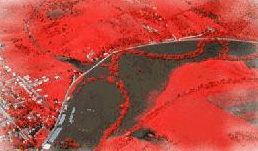In the following paragraphs, we describe the most important facts that you will want to know about the course: for example, when and where it meets, the names and office hours of the instructors, the course requirements, dates and times of the exams, and the Academic Honor Principle as it applies to the course.
The two sections of the course behave as one: That is, all of the required work is the same, as is the material that is covered. The grades are assigned as if all students were attending the same class. So, you should feel free to talk to either of us, even though you probably should seek out your own instructor first, primarily because we want to get to know as many of you as possible.
Textbook: The manuscript Principles of Calculus Modeling: An Interactive Approach, by Donald Kreider and Dwight Lahr, is available at the College Copy Center in Thayer. Each section of the book has a companion page on the Web which can be accessed at the klbook site.
Instructors:
Section 1: MWF 8:45–9:50 in Bradley 101 Auditorium
Dwight Lahr
410 Bradley, 646-2415
Office Hours: MTuW: 1:00–2:00 (and by appt.)
Section 2: MWF 11:15–12:20 in Bradley 101 Auditorium
Rosa Orellana
305 Bradley, 646-2430
Office hours: Wed: 9:45-10:45; Th: 10:30-12:30 (and by appt.)
Student Course Assistants:
Graduate Students:
Lizz Norton Moseman, 1I Bradley
Lee Stemkoski, 1H Bradley
Undergraduate Graders, Tutors:
Harold Bae
Steven Gay
Sehr Khandwala
Amyn Pesnani
Shawn Zhou
Class Meetings: Class meetings consist of three 65-minute lectures. The lectures introduce new material and provide the course structure.
Examinations: There will be two hour-exams and a (two-hour) final examination. The final exam has been scheduled by the Registrar's office for Sunday, December 8 at 10:30 a.m. Don't make any travel plans that might conflict with this time because all Math 3 students must be there. The two hour-exams are scheduled as follows:
Hour-Exam 1: Wednesday, Oct. 23, 3:30–4:45 p.m.
Hour-Exam 2: Wednesday, Nov. 13, 3:30–4:45 p.m.
Location: Sec. 1— 101 Bradley; Sec. 2— 28 Silsby
Each of the two hour-exams will consist of two parts—-a multiple-choice part and a non multiple-choice part where partial credit can be earned. The final exam will be multiple-
choice. No calculators or computers will be needed or allowed in the sit-down exams.
Daily Homework Problem Sets: Homework will be assigned at class meetings and usually will be due two class days later by 8:00 am; answers will be available at 1:00 p.m. on the same day. Late homework will not be accepted without an excuse from your
instructor, obtained well before the assignment is due. There will always be at least one class-day between the day homework is assigned and the day it is due, thereby providing plenty of opportunity for you to get your questions answered. You will get and turn in the Math 3 homework over the World Wide Web using WeBWorK.
Special Case Study in Calculus Assignments: This term we are going to develop four extended applications of calculus. They will be done in the form of what we will call a Case Study in Calculus (CSC). The CSC will be an example of using calculus to model real-world problems involving real data. They are like extended homework problems that require a written summary of your findings. For this reason, they count more heavily in the overall point total (see below) than the other homework assignments. In fact, some exam questions may cover material from the CSCs, so they may end up counting considerably more.
Academic Honor Principle: On the two hour-exams and the final examination you will work individually, guided by the Dartmouth Academic Honor Principle. On the daily homework exercises and on the CSC homework, you will turn in assignments individually, although you are encouraged to work collaboratively. As usual, collaboration does not include copying someone else's work—a clear violation of the Honor Principle. Feel free to talk with other students about the material. You may even decide to form a study group for that purpose. You also may seek assistance from a tutor or your instructor. When it comes to writing up the homework, however, you should do this by yourself without outside assistance, and in the case of reports, in your own words. In this regard, it is a violation of the Honor Principle to share electronic files or notes, or to participate in editing a joint document.
Grades: The course grade will be based upon the scores of the two hour-exams, the final examination, the Case Studies in Calculus, and the other homework, as follows:
Hour-Exams: 200 points (100 points each)
Final Exam: 100 points (multiple-choice)
CSC reports: 80 points (20 points for each)
Homework: 20 points
The total of 400 points will be the basis for final grades in the course.
Tutorials: Assistance on the daily homework can be obtained in 105 Bradley in tutorials staffed by undergraduate student tutors, and assistance on the CSCs can be gotten from the graduate Course Assistants in the matc lab in the basement of Bradley. All tutorials are scheduled from 7:00 to 9:00 pm on Sunday, Tuesday, and Thursday evenings.
Disabilities: We encourage students with documented disabilities, including "invisible" disabilities such as chronic diseases, learning disabilities, and psychiatric disabilities, to discuss possible accommodations with one of your instructors. Students might want to consult as well the Student Disabilities Coordinator, Nancy Pompian, at extension 6-2014, in the Academic
Skills Center. In addition to providing information and services, the Center is in charge of
registering disabilities and approving accommodations.
Math 3 Website: We have set up a website to organize the materials of the course. The address is http://www.math.dartmouth.edu/~m3f02/.
Have a good term. We look forward to working with you.


![]()